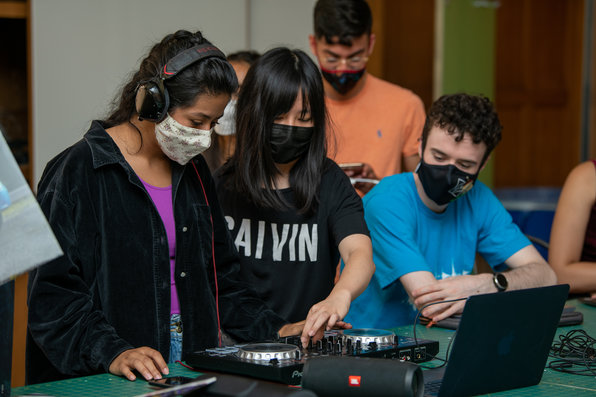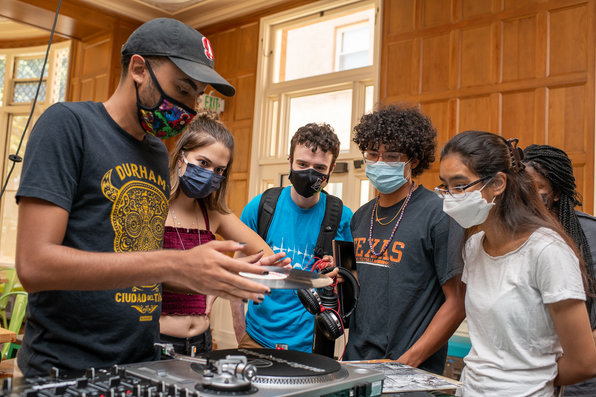Being an SCA
Each Sophomore College course has two SCAs (Sophomore College Assistant). SCAs are an integral part of a residential and experiential learning community such as Sophomore College.
A unique benefit of being an SCA is the relationship with faculty, who frequently become mentors or research advisors to the SCA. Course faculty select SCAs for a particular class based on their academic background in the topic, their past community-building experience, and their maturity and potential to be a class leader. SCAs also begin to understand course material at a deeper level, gaining a new perspective on their own learning. Mentoring younger students prompts SCAs to reflect and understand their own journey at Stanford while developing leadership abilities. SCAs develop skills in logistics, event planning, and budgeting, as they coordinate the details of field trips, guest speakers, and special events that enhance the classroom learning. And of course, SCAs participate in all the fun activities that are a key part of Sophomore College.
What SCAs Do
- SCAs are required to live in the Sophomore College residence halls with their students and use time outside class to foster collaborative and peer learning.
- SCAs work closely with the faculty in their course to organize events and activities that engage students in the course material in a hands-on way. Each course team (faculty and SCAs) manages their own schedule, developing plans that are customized to their particular course, drawing on the program for guidance and administrative assistance.
- SCAs act as peer learning mentors, helping students work through the course material and develop their intellectual skills. SCAs are not TAs and do not grade assignments, although they may offer informal feedback.
- SCAs support building community among the members of the class, planning and leading activities outside class time, and mentoring rising sophomores.
- SCAs have the ability to draw on a course budget to support such activities, and the responsibility to steward Stanford funds appropriately.
- SCAs act as Resident Assistants during the program, being trained in facilitation and emergency response measures (with support from the SoCo Program Director and live-in Graduate Resident Associates, as well as ResEd Resident Directors). They develop relationships with students that enable them to respond to stressed and struggling students.
What Former SCAs Say
- “My most important experience was during ‘SCA office hours’ when multiple students brought their questions to me. I loved being able to help them out, and it was great to know that they had the comfort around me and confidence in my knowledge to approach me for help.”
- “It was a lot of work, but very rewarding, to set up class activities, such as going to Google and the Computer Science Museum. Getting to talk with experts on their home turf added a rich dimension to our classroom learning.”
- “My most important experience was working with my co-SCA and learning more about my own leadership style and role in a team.”
- “Day-to-day life in the dorms -- helping students with papers, discussing ideas, or just talking about general life was the most important part of being an SCA.”
- “The best part of being an SCA was getting to know and forming relationships with the sophomores, and helping them/giving advice for their future at Stanford.”
- “One of my most valuable experiences as an SCA was being able to experience the course from the perspective of a teacher, rather than that of a student.”
- “The most important experiences related to listening and learning from each participant, bonding with my co-SCA, getting to know my professor better while becoming more comfortable around him, and serving as a small-group leader who cares for the participants.”
The Fine Print: Eligibility, Commitment, and Compensation
Are you eligible to be an SCA?
- You must be enrolled in Stanford classes in the autumn quarter after Sophomore College, as a junior, senior, co-term, or graduate Stanford student (grad students please read this addendum).
- You are in good academic standing.
- If you will not have a fall housing assignment on main campus, you are eligible to apply, but please recognize that program housing ends on Friday, September 13, 2024 although the program continues another week, and you will need to provide your own housing from that date, if your class is on campus.
Candidates will be vetted with campus partners, such as Residential Education, Office of Community Standards, and Academic Advising, Office of Accessible Education, and Vaden Health Center/Counseling and Psychological Services. Note: Vaden will not share confidential health information with the program, but may identify a concern with an applicant's readiness to participate, to be further addressed directly with the applicant.
Sophomore College reserves the right to revoke the appointment at any point prior to the program should there be any changes to a student's eligibility, qualifications, standing at the University, or readiness to participate in the program. Sophomore College will notify the student should there be any concerns and any such revocation would typically be preceded by discussions with the student.
Commitment
- Live with students in program housing and provide class support in building a joint residential and academic community through afternoon, evening, and weekend activities, both academic and social.
- Have no other conflicts from Friday, August 30 through Friday, 20 September, 2024 (or the end of your class, which may vary). SCA training begins 9:00am on Friday, August 30 and runs through the weekend. SCAs can move into program housing on Thursday, August 29, 2024.
Special timing notes:- SCAs for the 1-week SoCo Humanities Research Intensive ONLY begin late, and must have no other conflicts from Saturday, September 14 through Friday, September 20, 2024. HRI SCAs can move into academic year housing on the Friday and will do a short training on Saturday. Students arrive on Sunday.
- The Parks and Peoples class that travels to Tanzania ends when the class returns to campus on Saturday, September 21, 2024.
- All travel SCAs are required to return to main campus with the class.
- Attend the required Faculty/SCA Orientation Meeting in April (multiple times offered)
- SoCo is a substance-free community and you will be expected to support that community both through your own actions, and in guiding students (with the support and guidance of program staff).
- Sophomore College will follow the university regulations to ensure COVID-safe practices and interaction. As enrolled students at Stanford, SoCo participants will engage in the same masking and distancing expectations, same testing regime, same commitment to safe behavior, same contact tracing expectations, as set forth by VPSA in their guidance to on-campus students. As these change for September, Sophomore College will similarly adjust. As an SCA, you will need to uphold these regulations and guide students to abide by them (with the support and guidance of program staff).
- Offer full attention to Sophomore College during the program and training beforehand, with no other obligations including any part-time employment, training for residential positions, NSO commitments, or other activities. SCAs cannot work a part-time job or travel independently during the program; SCAs must focus exclusively on their role as class leaders. Students have a full 11 weeks of summer before beginning SCA duties, so department summer research positions or Haas fellowships generally end before SoCo begins.
- It may be possible to navigate limited conflicts depending on the specific details and the class you are taking, such as with LSP or SSEA summer RAs, or BOSP ambassador positions. Please begin such discussions as soon as you are offered a place as an SCA.
- Known conflicts that cannot be resolved: Residence Staff training, New Student Orientation (NSO), Faces of Community presentations all conflict with the Sophomore College dates, and so students must elect to be an SCA or choose to fill one of the other positions—it is not possible to be an SCA while holding any NSO or ResEd commitment. Several BOSP programs are also impossible, depending on their specific arrival date.
Compensation
Compensation varies by the type of SCA.
- SCAs for On-Campus classes receive $2500, paid as stipend through the student account during the program. Graduate students receive $3000 and must have their departments' pre-approval before their position can be confirmed.
- The On-Campus SCAs for the SoCo Humanities Research Intensive have a much shorter commitment and receive $835 as stipend, or $1000 for graduate students (with department pre-approval).
- SCAs for Travel Classes work longer hours while on the road and carry a heavier burden of responsibility, as program staff can only advise from a distance. Travel SCAs are hired through the Axess payroll system and receive $4,565.33 before tax withholding, divided unevenly between the 9/7, 9/22, and 10/7 pay periods. The rate is the same for undergrad and grad students. Payroll documents including I-9 verification are required for Travel SCAs.
Room and Board
- Dining: SCAs receive on-campus dining for the length of the program, until dining contracts begin. The last program-provided meal is dinner on Thursday before classes begin; residences open the next day, although some residences delay the beginning of dining contracts.
- Housing: SCAs live in program housing (in single rooms) until Friday, September 13, 2024 when SCAs move into their autumn housing assignments for the remainder of the program. Undergraduate SCAs living on-campus will be reimbursed for early arrival to autumn housing assignments.












